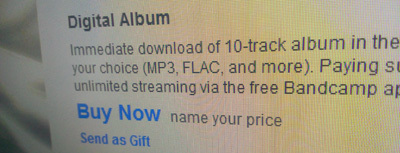Bandcamp subscriptions
So… I realise it’s been quite a while since I last posted a proper update here.
To be perfectly honest, I had been planning on waiting until I gave this site a complete overhaul, but I figured it had been such a long time since my last update that I should probably elucidate some of the ideas I’ve got for next year. So – here goes!
Starting in 2016, I’m going to be using Bandcamp subscriptions. Basically, what this means is that – for an annual flat fee – you’ll have access to the following.
- Immediate access to my entire Bandcamp back catalogue, including all bonus extras. This means that you’ll get access to my independent solo albums (including Distant Activity, Lightfields, Pieces, and Obscurer), along with all the tasty bonuses – i.e. for now, the audiophile & extended versions of Pieces.
- Full access to all future Bandcamp releases (including all extra bonuses) while your subscription is active. As soon as I release anything, you’ll be notified and will receive full and immediate access to the music in your format of choice.
“But Adam!”, I hear you say. “All of your Bandcamp music is Pay-What-You-Want! Why would I pay for an annual subscription when I can already download your music for free?“.
That’s a fair question – and I guess besides the obvious “I like money and I need your support to sustain my extravagant Fabergé egg addiction“, I should probably throw in something extra… which leads me nicely onto:
- Access to an ongoing series of SUBSCRIBER EXCLUSIVE releases.
“But Adam!”, I hear you say. “What the hell. Why are you going to lock future releases behind a paywall?”.
That’s another fair question – again, I guess besides the obvious “I like money and I need your support to sustain the lifestyle to which my cat has become accustomed”, I should probably explain what sort of thing I have in mind for these exclusive releases, and what that means for my future album releases.
First up: All of my future “main” albums/EPs will still be available as PWYW releases to all non-subscribers. The extra content (bonus tracks, alt. masters, instrumentals, etc.) will be subscriber only, but the main meat of the albums/EPs will still be available in the exact same manner as before.
The reason for making this bonus content subscriber-exclusive is two-fold: obviously, there’s the aforementioned “I like money” angle. Also, my current process of manually e-mailing out codes to people is pretty archaic, and it’s only going to get worse as I release more bonus content (which I absolutely assuredly will be doing). By doing this, it’ll automate the entire process. For anyone who’s received a dodgy code or couldn’t get the bonus content to download properly, this will probably come as a welcome relief.
Secondly: I should probably explain what sort of thing I have in mind for “subscriber exclusive” releases. Here are some of the ideas I’m working on:
- Previously unreleased production music
- Unreleased, re-mixed/re-mastered archive material
- Music from my “October sessions”
- Hardware jams and extended sessions
…and so on. Basically – music that I’m really, really, really happy with, but wouldn’t fit into a “standard” release.
I understand that, right now, it sounds like this requires a bit like a leap of faith as there is no guarantee of the kind of material I’m going to be releasing as exclusive content. That’s totally fair. What I will say is that I have at least three releases planned for next year, two of which are going to be subscriber exclusive. As soon as I release some sort of exclusive content, I’ll make it available for non-subscribers to stream so you can at least get a taste of what to expect.
Onto the pricing: Annual subscriptions are going to be set at £15, but until the first exclusive release I’m going to enable early-bird annual subscriptions at £10. The first exclusive release will be coming in January. So.., right now, grab yourself a nice Christmas treat 😉
On a personal note, this is all a bit of an experiment for me – much like the unorthodox release of Pieces, I want to try something new out. I want to make sure I’m not standing in the way of people who want to listen to my music, but I want to say “thank you” to people who choose to support me. For most people, the appeal of Bandcamp subscriptions is in gaining access to a musician’s entire back catalogue – and I guess that’s still the case here… but I really like the idea of sharing my less heavily publicised output with people who really want to check it out. So, that’s the plan.



